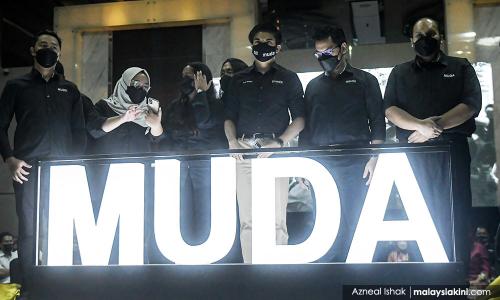LETTER | Why rakyat should vote for Muda in GE15
LETTER | Muda represents a potential opportunity to break the patterns of exclusion and patriarchy presently practiced and seen in the Malaysian political landscape.
The coming general election is that and the moment.
Public confidence in all the political parties, be it from the governing coalition or those opposed to it, are at an all-time low.
The majority of the rakyat viewed them as non-personified, inaccessible and unresponsive to their concerns.
All and each of them claimed they are representing the voices of the rakyat when in actual fact, the individuals are climbing over each other and fighting head over heels jockeying for positions which would allow them possible and potential access to enriching their fiefdom.
The rakyat have witnessed how the politicians conduct themselves with brutal savagery over the last two decades or so, gaining in intensity with each change in leadership, both in government and party hierarchies.
And the rakyat also witnessed how, when the long arm of the laws catches up with them, the laws and regulations were applied “differently” to them.
All the existing parties are anchored along hypermasculine cultures.
And each party practiced gender exclusion in party development.
The present group of political parties made or claimed to have made formal commitments to gender equality, but most fall short of living out such commitments or achieving a high degree of inclusion.
Yes, they can claim they have a women’s wing. But in reality, the women’s wing is often relegated to supporting roles and contends with direct resistance to their participation and leadership.
While female party members may express their commitment to women’s rights, their parties generally are silent or opaque in pushing for gender equality reforms, eg citizenship rights for children born to a Malaysian mother married to a foreign spouse.
The men in all these parties rely on their dominance to selectively empower women who demonstrate party loyalty while giving the appearance of greater inclusion.
Female party members generally adhere to the party line, whereas those who challenge the dominant order typically face repression.
As it is now, existing political parties pose specific challenges for women, who face both formal and informal barriers to participation, including opaque nomination procedures.
And it is often extremely difficult to eliminate these gendered power imbalances in established parties.
A democracy for Malaysia without the participation of half a country’s population is not a democracy.
Women and men are entitled to equal civil and political rights, as enshrined in the Universal Declaration of Human Rights, the International Covenant on Civil and Political Rights, and other international commitments.

Muda has already broken the norm by establishing rules and norms that promote women’s participation while others do not.
A successful outing by Muda in the coming polls could likely result in existing political orders being fundamentally renegotiated and make it more conducive to gender inclusion enabling women in other political parties and civil society to build alliances and push for specific legal reforms and political commitments, including national or party-level quotas.
A successful outing for MUDA can be opening to transform the broader political, legal, and social barriers to an inclusive kind of politics.
In these moments of flux, the development of new rules, as well as the renegotiation of broader institutional frameworks, will enable women and other marginalised groups to push for greater political representation within party structures.
A growing body of evidence indicates that women’s political participation can lead to tangible democratic gains, including greater policy responsiveness to diverse citizen needs, reduced risk of conflict recurrence, and higher levels of political stability.
Political parties in other countries that take women’s participation seriously have shown that they benefit electorally by accessing new groups of voters and signalling their commitment to social change.
Muda has shown that women and men participate equally in party leadership and decision-making, have equal chances of being nominated and elected, and influence party policies and priorities without fear of backlash or reprisals.
The present leadership in Muda are not like certain politicians from other parties that argued that women were not sufficiently qualified or that they lacked attributes that would make them more electable in the eyes of voters while failing to acknowledge and admit that it was them who were actively blocking their advancement and were not doing enough to build a pipeline of female candidates and leaders.
With its growing strength and relative success in mobilising civil society – such as the Aunties Brigade - Muda should lead the way by implementing a vertical gender parity measure, mandating that candidates on their electoral list alternate between female and male or have the same number of male and female-headed lists across all constituencies in which they are running.
The Aunties Brigade could even be a platform for other women who would not call themselves feminists, but are committed to women’s empowerment and had previously been excluded from politics.
The present political landscape where no existing political coalition is likely to emerge dominant in governing the country produced a significant political opening and Muda, with its policies on women, should take the lead in pushing for institutional reforms on gender equality commitments.
Women in this country have a long history of mobilisation. It was women who mobilised and raised the funds for Tunku Abdul Rahman to go to London to seek independence for the country almost 65 years ago.
So start by drawing on women with strong social ties on its electoral candidate list.
It was the predominantly female bench on the Federal Court that returned trust and integrity to the country’s judiciary.
Muda, with a progressive and dominant lineup of women, could be the catalyst to rejuvenate and return the country to its destined path.
So dear voters, your subsequent generations would be proud of you for helping to return the country to its destined path.
The views expressed here are those of the author/contributor and do not necessarily represent the views of Malaysiakini.
RM12.50 / month
- Unlimited access to award-winning journalism
- Comment and share your opinions on all our articles
- Gift interesting stories to your friends
- Tax deductable
